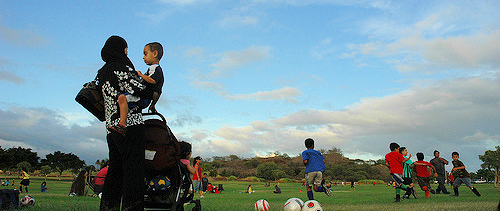
My Wife Taught a Muslim How to Drive!
If my wife were running for president, the 30-second attack ad would probably show a black and white image of rioting Muslims burning a U.S. flag superimposed over a photo of how Debi looks when I forget to take out the garbage. A stern voice would then say, “Debi Santos taught a Muslim how to drive. Debi Santos hates America. Don’t vote for Debi Santos.”
Because we have so little firsthand information about anything, we tend to live in a world of stereotypes. What we think we know is often based on a series of images constructed by water cooler gossip, media reports, political ads and carefully crafted public relations campaigns. All too often these images are completely inaccurate.
During our years in college ministry, Debi and I took an interest in hosting international students. It was an excellent opportunity for us to express the love of Christ by meeting with internationals once or twice a month. Our lives were enriched by these relationships.
Fatin was a Muslim teacher from Jordan pursuing a higher degree in English so that she could teach at the university-level back home. Added to the burden of higher education in a distant land, was her need to care for two small children while her husband remained in Jordan for work. With the common bond of motherhood, Debi and Fatin became immediate friends. Recognizing her need for transportation, my wife also offered to teach Fatin how to drive. This all took place not long after 9/11, which presented additional but not insurmountable challenges.
I too, had the opportunity to interact with Fatin and her beautiful children, to meet a few of her Muslim friends and to eventually share dinner with the entire family during one of her husband’s visits. Through the years I have met several other Muslims and most have been sincere, warm and friendly; putting a great deal of value on family and friendship—much more than we see in most Christian circles in the U.S.
Several of us in campus ministry later shared office space with students involved with the Muslim Student Association. That experience, for the most part, was negative. The young men were cold and distant—we could not help but wonder if they were involved in some type of terrorist activity. Regardless, we did our best to treat them with respect.
Another significant interaction with a Muslim student took place pre-9/11. He was a very sincere young man with a humble heart and a genuine desire to seek truth. Eventually, and with no pressure from our group, he converted from Islam to Christianity. But things didn’t go so well after that. His father, a high ranking government official, removed him from college in the U.S. and essentially put the young man under house arrest for a season. In spite of repeated efforts on our part, we never heard from him again.
Why do I share this wide range of experiences? In order to show that just as there are significant differences between Christianity and Islam, so there are between Muslims. However, the bottom line is that as Christians, love is our highest call. Would Jesus call it sin to share genuine friendship with those who might be considered our theological enemies? I think not.
As a Bible-believing Christian, I am no religious pluralist. I believe in the supreme uniqueness of Jesus Christ and reject the ideas that all religions are the same and that all paths lead to God. Having said this, I am embarrassed and ashamed by some of the things I see being done and said in the name of Christ.
When I consider the deaths of U.S. Ambassador Christopher Stevens and other Americans in Libya this week, I find myself deeply disturbed on several fronts. The loss of life is tragic. That they were attacked in a country that the U.S. helped to liberate is highly troublesome. That even one professing Christian may have somehow had a hand in promoting the deplorable film (Innocence of Muslims) that served to unnecessarily heighten tensions between us and them is beyond foolish.
The Apostle Paul and his associates once sparked a riot with their evangelistic efforts in Ephesus. The town clerk finally quieted the crowd by making this amazing statement about those Christian evangelists: “For you have brought these men here who are neither robbers of temples nor blasphemers of our goddess” (Acts 19:37). Paul and his friends apparently lived out the Biblical mandate given by Peter to honor all people (1 Peter 2:17).
If persecution happens because we are faithful to the Gospel, then so be it. Jesus promised as much. But to express any type of contempt or disrespect toward those of other belief systems is to do horrible disservice to humanity, the Gospel and ultimately the God we profess to cherish.
If the Spirit of the living God truly dwells within us, we can do better, much better.
banner photo by Keoni Cabrai – CC BY 2.0



